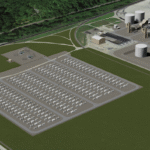The Importance of Renewable Energy Efficiency
As the world transitions to a cleaner and more sustainable energy mix, the importance of renewable energy efficiency cannot be overstated. Renewable energy sources such as solar and wind power offer a cleaner and more sustainable alternative to fossil fuels, but they are often intermittent and variable, making it challenging to rely solely on them.Boosting renewable energy efficiency is crucial to ensure a stable and reliable energy supply.
Innovative Technologies for Boosting Renewable Energy Efficiency
Solar Energy
Solar energy is one of the most promising sources of renewable energy, and advancements in solar panel technology have made it more efficient and cost-effective. Inverters, for instance, play a crucial role in maximizing solar energy harvesting by converting DC power from solar panels to AC power for use in homes and businesses.
Wind Energy
Wind energy is another promising source of renewable energy, and advancements in wind turbine design and materials have increased efficiency and reduced costs. Larger rotors and advanced blade designs have improved the efficiency of wind turbines, allowing them to generate more power at lower wind speeds.
Energy Storage
Energy storage is a critical component of renewable energy systems, as it enables the integration of intermittent renewable energy sources into the grid. Batteries, in particular, have made significant advancements in recent years, offering high efficiency and long lifespan.
Strategies for Boosting Renewable Energy Efficiency
Grid-scale energy storage is a critical strategy for boosting renewable energy efficiency, as it enables the integration of intermittent renewable energy sources into the grid. Pumped hydro storage and compressed air energy storage are two of the most effective forms of grid-scale energy storage. Smart grid management is another critical strategy for boosting renewable energy efficiency, as it enables the efficient integration of renewable energy sources into the grid. Advanced grid management systems use real-time data and predictive analytics to optimize energy distribution and reduce losses. Demand response and load management are critical strategies for boosting renewable energy efficiency, as they enable the management of energy demand in response to changes in renewable energy output. Advanced demand response systems use real-time data and predictive analytics to optimize energy consumption and reduce strain on the grid. Boosting renewable energy efficiency is crucial to ensuring a stable and reliable energy supply. Innovative technologies such as solar energy, wind energy, and energy storage, combined with strategies such as grid-scale energy storage, smart grid management, and demand response and load management, offer a viable path forward for a sustainable energy future. Q: What is the importance of renewable energy efficiency? A: Renewable energy efficiency is crucial to ensure a stable and reliable energy supply. It enables the integration of intermittent renewable energy sources into the grid, reducing strain on the grid and enabling a cleaner and more sustainable energy mix. Q: What are some innovative technologies for boosting renewable energy efficiency? A: Some innovative technologies for boosting renewable energy efficiency include solar energy, wind energy, and energy storage. Advances in solar panel technology, wind turbine design, and battery storage have made it possible to harness renewable energy more efficiently and cost-effectively. Q: What are some strategies for boosting renewable energy efficiency? A: Some strategies for boosting renewable energy efficiency include grid-scale energy storage, smart grid management, and demand response and load management. These strategies enable the efficient integration of renewable energy sources into the grid and optimize energy distribution and consumption. Q: What is the future of renewable energy efficiency? A: The future of renewable energy efficiency looks promising, with continued innovation and advancements in technology enabling the integration of intermittent renewable energy sources into the grid. As the world continues to transition to a cleaner and more sustainable energy mix, renewable energy efficiency will play a critical role in ensuring a stable and reliable energy supply.Conclusion
FAQs





.png?w=150&resize=150,150&ssl=1)

.png?w=150&resize=150,150&ssl=1)